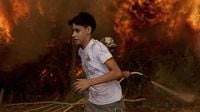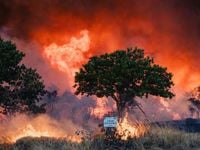Spain and Portugal are grappling with a wildfire crisis of historic proportions, as flames continue to ravage vast swathes of the Iberian Peninsula. The summer of 2025 has brought record-breaking destruction, the likes of which firefighters and residents alike say they have never witnessed before. With more than 20 major wildfires raging across western Spain as of August 19, and Portugal facing its own infernos, both nations are counting the toll in lost lives, destroyed land, and shattered communities.
According to the European Forest Fire Information System (EFFIS), Spain has already lost over 382,000 hectares—more than twice the size of London—to wildfires this year. This figure not only eclipses the previous record of 306,000 hectares set in 2022 but also marks the most devastating wildfire season since records began in 2006. In Portugal, the devastation is also severe, with about 235,000 hectares scorched this summer, five times the seasonal average, as reported by The Daily Mail and other outlets.
The causes of this catastrophe are as complex as they are alarming. Both countries have been battered by a 16-day heatwave, with temperatures soaring above 45 degrees Celsius (113 degrees Fahrenheit). The Carlos III Health Institute in Spain has linked more than 1,100 deaths to this brutal stretch of weather between August 3 and August 18. Official figures show 1,149 excess deaths during that period, and experts suggest many are tied to the relentless heat. Drought conditions, already severe, have left the landscape tinder-dry and primed for disaster.
"We are at war, and we must triumph in this fight," declared Portuguese Prime Minister Luis Montenegro on August 18, as reported by Anadolu Agency. Montenegro described the weather as of "unprecedented severity," with high temperatures and strong winds making the firefighters’ task even more daunting. Spain’s Prime Minister Pedro Sánchez, meanwhile, warned the nation that "difficult hours remain" as exhausted emergency crews continue to battle infernos that have destroyed villages, severed rail links, and forced mass evacuations across the country. Sánchez has called for a cross-party pact to confront what he described as a worsening "climate emergency."
The human cost is mounting. Four people have died in Spain, including a firefighter killed in a road accident, and two firefighters have lost their lives in Portugal under similar circumstances. Others remain hospitalized with serious injuries. Thousands have been forced to flee their homes, and several roads have been sealed off completely. The King of Spain even cut short his summer break to receive emergency briefings—a stark symbol of the gravity of the crisis.
The fires have concentrated especially in Spain's western regions—Castile and Leon, Galicia, and Extremadura—where 23 blazes have reached "operational level two," meaning they pose a direct threat to nearby communities, according to Spain’s civil protection chief, Virginia Barcones. In Portugal, around 2,000 firefighters were deployed on August 18, with half concentrated in the hard-hit town of Arganil.
International solidarity has come into play, as Spain has received firefighting aircraft from France, Italy, Slovakia, and the Netherlands, while Portugal has been supported by air crews from Sweden and Morocco. However, the scale and severity of the fires, combined with intense smoke, have made airborne firefighting operations extremely challenging. Spanish Defence Minister Margarita Robles told TVE that "airborne action" was being hampered by the intensity of the smoke and the size of the blazes.
There’s a glimmer of hope, however. Spain’s meteorological agency reported that the heatwave, which had seen temperatures hit 45 degrees Celsius in parts of the country, was coming to an end around August 19. Lower temperatures on Tuesday gave fire crews a much-needed advantage in their battle against the flames. Yet, as Prime Minister Sánchez cautioned, "Critical moments remain, difficult hours remain." He urged both the media and citizens to exercise extreme caution and to not let their guard down, even as conditions marginally improved.
The destruction is not limited to forests and fields. Villages have been destroyed, rail links severed, and mass evacuations have become routine. In hard-hit regions such as Zamora, León, Ourense, and Cáceres, the relentless advance of the fire has left communities reeling. Emergency crews, supported by soldiers and a fleet of aircraft brought in under the European Union's civil protection mechanism, are working around the clock. The emotional toll is palpable, with families recounting harrowing escapes and the loss of homes and livelihoods.
Authorities are also grappling with the criminal element behind some of the fires. Arson is suspected in several incidents, with 27 people arrested and dozens more under investigation. The regional leader of Castile and León stated, "We will be relentless with the perpetrators of these attacks against the lives and safety of people and our historical and natural heritage." The scale of the investigation underscores the complexity of the crisis, as both natural and human factors contribute to the devastation.
The impact of the wildfires extends far beyond Spain and Portugal. Across southern Europe, countries like Turkey, Cyprus, Albania, Italy, and France have all faced severe wildfires this summer. In Turkey, at least 13 people have died, including emergency responders, as disaster zones have been declared along the Mediterranean coast. In Cyprus, wildfires in the Limassol district destroyed homes and infrastructure and killed two people attempting to escape in their car. Greece’s island of Crete was placed under a state of emergency as flames advanced on resorts and residential areas. The season has been described as one of the worst for wildfires across the continent.
Climate change is increasingly cited as the underlying driver of these extreme events. As Prime Minister Sánchez observed during his visit to Extremadura, "Every year the climate emergency worsens, every year it becomes more recurrent, and every year its effects accelerate." The call for a "state pact to confront the climate emergency" reflects a growing consensus that new strategies and greater cooperation are needed to address the mounting risks. Even as Spain and Portugal look to the immediate challenge of extinguishing the flames, many are already asking what must be done to prevent such disasters in the future.
As the fires continue to burn and the smoke lingers over the Iberian Peninsula, the sense of urgency is unmistakable. With lives lost, landscapes scarred, and communities on edge, the summer of 2025 stands as a sobering reminder of the power of nature—and the growing threats posed by a changing climate. The efforts of thousands of firefighters, the mobilization of international aid, and the resolve of leaders and citizens alike will be tested in the weeks to come, as Spain and Portugal strive to overcome "difficult hours" and chart a path toward recovery.


